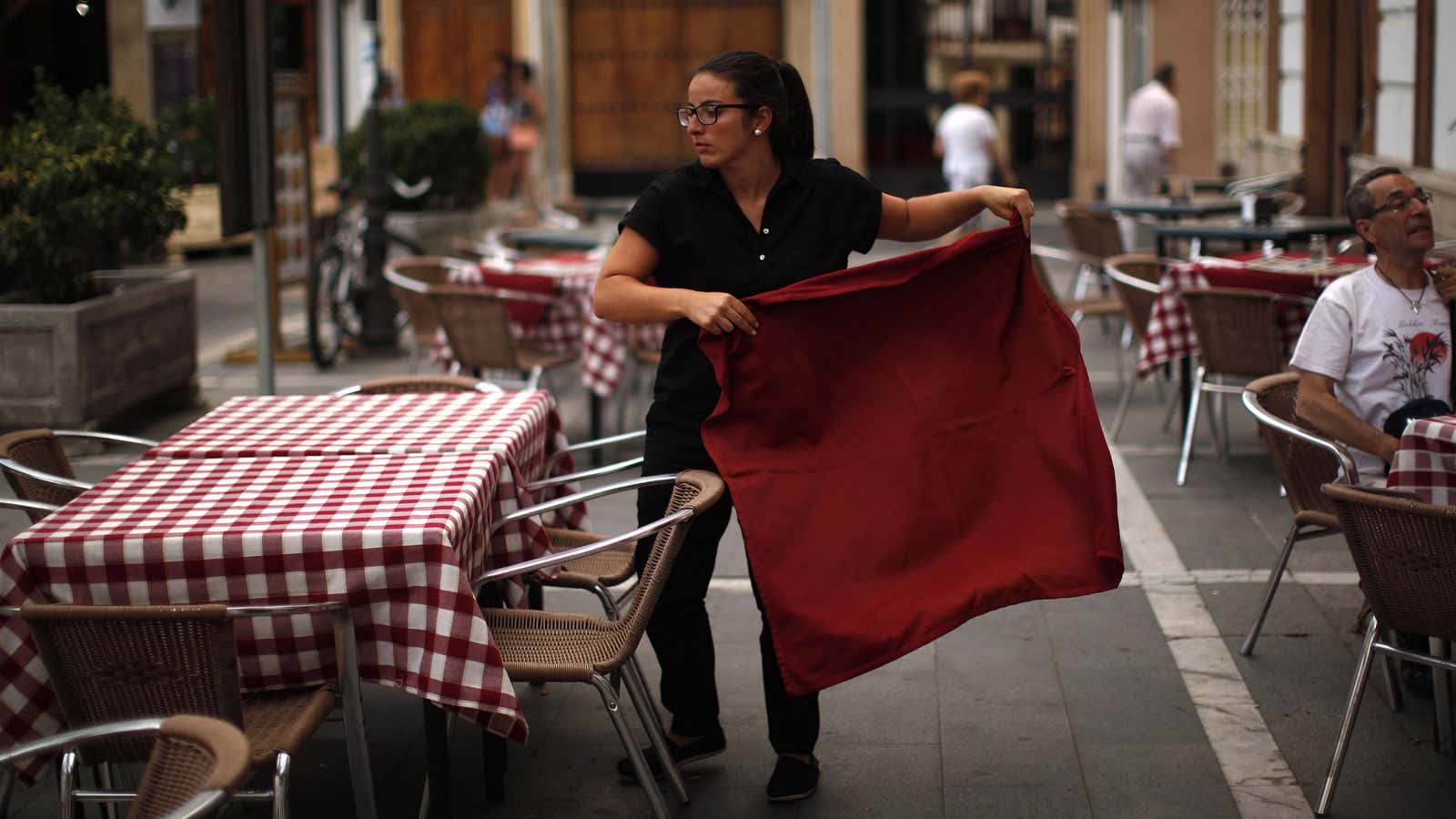Jimmie Luthuli, 34, has worked as a waitress all over Washington. She’s fetched drinks on U Street, wiped down tables on Barracks Row, and taken orders on K Street. The scenery changed but her pay didn’t: $2.77 an hour before tips.
Those meager wages were typically swallowed up by taxes, she said, leaving her to subsist on an unsteady income of tips. “Sometimes I would only get one table the whole five-hour lunch shift and then that table would leave me $5, and that would basically be my pay for the day,” Luthuli told me over her lunch break on Wednesday. “I was coming home with only $80 or $100 for a whole week of work.”
In 2009, the federal government raised the minimum wage to $7.25 per hour—but, under lobbying pressure from the restaurant industry, it did nothing for the many thousands of people who work for gratuities. Under a lesser-known subsection of the minimum-wage law known as the “tipped minimum wage,” service workers may be paid as little as $2.13 an hour. Another lesser-known fact: That wage has been stagnant for the past 23 years.
While some states and DC have made modest increases to the tipped minimum wage on their own (modest in the District’s case being 64 cents), and eight states have no tipped minimum wage at all, about half of all states continue to pay workers just $2.13 an hour, provided employers make up the difference if a server fails to achieve the standard minimum wage after tips. It’s a particularly troubling statistic for women who make up two-thirds of tipped workers nationally and are regularly—some would say systematically—paid less than men.
A new analysis by the National Women’s Law Center found that in the eight “equal treatment” states where tipped workers are entitled to be paid the full federal minimum wage by their employers ($7.25), the wage gap between men and women is smaller, and poverty rates among tipped workers (particularly women) are lower than in states where tipped workers make a base wage of just $2.13 an hour. More specifically, the average wage gap is 17% smaller for women overall working full time; the average poverty rate for female tipped workers is 33% lower.
The analysis, which drew data from the Census Bureau’s recent American Community Surveys, also emphasized that the situation is especially bad for people of color. In states with a tipped minimum wage of $2.13 per hour, African-American women working full time, year round are paid on average just 60 cents for every dollar earned by their white male counterparts (a wage gap of 40 cents). In “equal treatment states,” the wage gap drops to 33 cents. Hispanic women fare worst of all, earning just 51 cents on the white male dollar in the former (wage gap: 49 cents) and 53 cents on the white male dollar in the latter (wage gap: 47 cents).
“What was striking to me was the variety of ways in which the inequality that’s associated with the existence of this large tip credit manifests itself,” said Katherine Gallagher Robbins, a senior policy analyst at NWLC and coauthor of the report. “We see repeatedly, no matter how you slice the data, workers in these states are doing worse.” Her coauthor, NWLC’s Julie Vogtman, said she was struck by the extent to which the effects of a low cash wage for tipped workers “radiated out” to affect the wider wage gap in these states.
Industry groups have argued that the $2.13 base wage is a misnomer. Every tipped worker is guaranteed at least the minimum wage of their state, after all. And it’s the employer’s legal responsibility to make up the difference between the tipped minimum cash wage and the regular minimum wage, if a server’s tips fall short. The trouble is, whether employers are deliberately dodging this requirement or are simply held back by logistics, many workers never see that money at all.
A recently released report from the Economic Policy Institute underscores the problem. In the most recent compliance sweep of full-service restaurants by the US Labor Department’s Wage and Hour Division, 83.8% of investigated restaurants had some type of violation. “In total, WHD recovered $56.8 million in back wages for nearly 82,000 workers and assessed $2.5 million in civil money penalties,” the Labor Department reported. “Violations included 1,170 tip credit infractions that resulted in nearly $5.5 million in back wages.”
The latest NWLC analysis comes as the Senate eyes a new vote on a minimum-wage bill that would increase the regular federal minimum wage from $7.25 to $10.10. The bill would also reestablish the link between the tipped and the regular minimum wages, raising the former to 70% of the latter within six years. Senate Majority Leader Harry Reid’s office has been coy on timing, but people well sourced in the matter say the proposal could come up for a vote as soon as next week.
The minimum-wage bill isn’t everything advocates are hoping for, but it would certainly improve the situation for tipped workers, adding greater stability to their income and boosting their total pay. In a conversation Wednesday, NWLC’s Vogtman called it a “very important step in the right direction.”
Luthuli, for her part, isn’t waiting around to see how it goes. She’s channeled her frustration by volunteering with the Restaurant Opportunities Center, an advocacy group that, according to organizers, is working on legislation to eliminate the tipped minimum wage in eight states. She’s also working odd jobs to pay the bills, including some freelance consulting and four shifts per week as a food runner at a restaurant on U street.
“I decided it’s better to be a food runner than a server,” she said. “It only pays around $6 an hour, but I like it because at least I know my hourly wages. For me it comes out to more money.”
This post originally appeared at The Atlantic. More from our sister site:
The nation that Janet Jackson built




